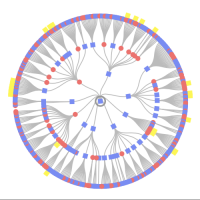User Quality Control - FamilySearch Tree's Biggest Problem
I love FamilySearch. It's transformed the way I do my genealogy research, and it's a great way to connect with other researchers and avoid people doing the same work multiple times. But the fact that anyone can change almost anything on the family tree (except some famous people) creates a serious quality control issue.
I'm sure every serious genealogist on FamilySearch has experienced this at some point. You spend hours researching someone, carefully piecing together clues to make sure you're confident the information and relationships are correct. Then someone else comes barrelling along, doesn't think very hard about what they're doing, merges them (and their records) with someone completely different, removes relationships, changes dates, etc. There needs to be some way of preventing this wanton destruction of time, energy and accuracy.
I have been a hobby genealogist for 20 years, and have serious academic research credentials that inform my methods. I have been using FamilySearch for genealogical information for a long time and since moving my family tree to it a few years ago I have become a very experienced user. I love the collaborative culture, but that collaboration currently comes at a price, and I know other genealogists who specifically avoid using the FamilySearch tree because of this precise quality control problem.
Wikipedia had to deal with this too - collaborative services are very powerful, but they need quality control in their information. Perhaps FamilySearch could take inspiration from Wikipedia and introduce different user levels, such as a "superuser" category, which allows certain highly trusted researchers to lock specific information on individuals, in order to avoid this problem. You could even give individuals in the tree a quality "tick of approval" that helps to give researchers confidence in the work of others. Or perhaps users can verify information that other users have put in (though this could be subject to confirmation bias). There would need to be a mechanism to correct locked information where required of course, but at least it would stop renegade users wreaking havoc.
FamilySearch Tree is currently being avoided by many genealogists. But if its quality control can be protected, I really believe that its collaborative methods will lead it to become the most respected and valued family tree service in the world (like Wikipedia is for encyclopedias).
Comments
-
Regarding this issue,
I find that entering data for Royalty and Nobility is very sloppy between different sites.
There needs to be a set format for entering their data so it becomes uniform across all sites. This will decrease duplications of profiles.
The set format should be (1) First title of person; (2) Christian Names (3) Surname (that is created from the first title or Dynastic surname) and highest title followed by lesser titles in decreasing hierarchy.
The full order of precedent of titles of royalty and nobility of each country should be used by people who hold titles within those countries.
If all titles can't fit onto the primary profile, the subsequent titles should be placed in another part of the profile document.
E.g. Charles, Prince of Wales should be Prince of Great Britain; Charles Philip Arthur George Mountbatten-Windsor; Prince of Wales; Duke of Cornwall; Duke of Rothesay; Duke of Edinburgh; Lord of the Isles, Great Steward of Scotland, Earl of Carrick, 1st Earl of Chester, Baron of Renfrew; K.G; G.C.B; P.C; K.T; A.K; NZ Q.S.O.
Previous surname: Windsor
HONARY APPONTMENTS
flight lieutenant in the Royal Air Force in 1972. honorary appointment in the armed forces was as Colonel-in-Chief of the Royal Regiment of Wales in 1969; since then, the prince has also been installed as Colonel-in-Chief, Colonel, Honorary Air Commodore, Air Commodore-in-Chief, Deputy Colonel-in-Chief, Royal Honorary Colonel, Royal Colonel, and Honorary Commodore of at least 32 military formations throughout the Commonwealth, including the Royal Gurkha Rifles, which is the only foreign regiment in the British army 2009, Charles holds the second-highest ranks in all three branches of the Canadian Forces and, on 16 June 2012, the Queen awarded the Prince of Wales honorary five-star rank in all three branches of the British Armed Forces, "to acknowledge his support in her role as Commander-in-Chief", installing him as Admiral of the Fleet, Field Marshal and Marshal of the Royal Air Force inducted into seven orders and received eight decorations from the Commonwealth realms, and has been the recipient of 20 different honours from foreign states, as well as nine honorary degrees from universities in the United Kingdom, Australia, and New Zealand.
Sourced from Wikipedia and thepeerage.com
0 -
I hope Family Tree never acquires the overburden of bureaucratic layers that English Wikipedia has grown.
0
